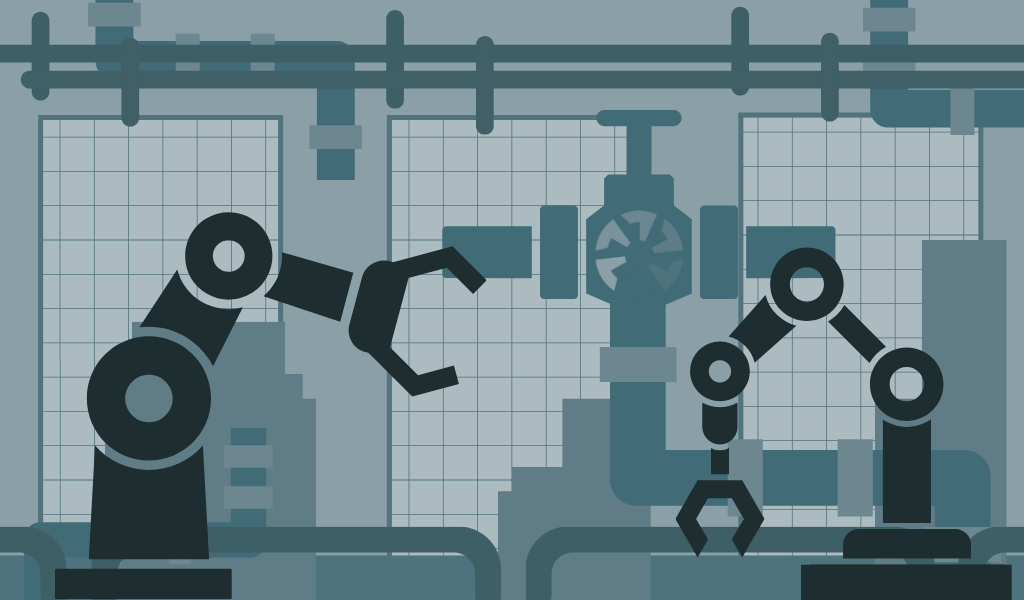Every sci-fi movie or book set in the future speaks of robots taking over the world, or at least serving us our Sunday brunch. While we aren’t quite there yet, the future of robotics is already here and has been a big part of our labor force for some time now.

How exactly did we get here though? Why is the robotics industry suddenly such a booming market?
Demand is Changing the Robotics Automation Industry
Like most fast-growing industries, the increased focus on the robotics automation industry is largely due to an increase in demand. Manufacturers increasingly need more throughput, accuracy and up time in their production but a dwindling labor market is making that difficult.
The History of the Robotic Joint
Robotics automation isn’t exactly a new concept. While robotic joints and arms become more and more sophisticated with new technology, the concept and use has been around since the 1970s and 1980s.
The primary focus of robots in the earlier years was to perform the industrial tasks that humans couldn’t. For instance, on a production line for vehicles, a robot could lift a large windshield and place it on a vehicle and eliminate the need for the multiple humans that would normally be needed for that task.
These robots would typically be quite expensive as well as large in size and weight, and operate independent of their human counterparts. They performed more basic tasks that presented a need most often associated with a product’s weight or size.
Over the years, manufacturers saw additional needs for robots. The 1990s brought the first big wave of companies demanding lower cost, smaller size and weight, less redundancy, and more sophistication in the movement of robots. They wanted to utilize robotic joints for more than just heavy lifting. They wanted these machines to operate alongside their labor force.
Robots Fill a Labor Force Need
As geopolitical climates change, more production comes stateside, and the manual labor force has dwindled, robots offer very specific advantages to all types of industries. Merely replacing human work has become top of mind for so many producers.
In order for robots to work alongside humans, robotic joints had to become more sophisticated. No longer could they independently sit in large warehouses performing only one function. If they were to work alongside humans doing more strategic work, they needed to be safe and intelligent.
These robotic joints would evolve to have sensors to know when something wasn’t quite right so they could stop production. They also needed to perform actions that would keep their human counterparts safe on the production line. Additionally, they needed to be efficient and cost effective. All of these needs have changed the robotics industry as a whole. With more sophisticated robots came the need for innovative robotic gear motion technology and the engineers to design it.
Data Drives Robotics, Too
When we think about replacing human labor, we often think about the very specific tasks they perform. But another advantage to leveraging robotics for tasks that humans used to perform is both the accuracy and the unbiased data around their efficiency.
For instance, you might ask an employee about any challenges or mishaps in their work during a given time period. They may be able to recall things that need to be improved upon, but with what degree of accuracy?
The nature of robotics automation is that the data coming out of robots doesn’t lie. In our data-driven world, companies can collect very specific and dependable data around how their robots are actually performing. This allows for more accurate predictions around things like budget and output. That kind of data can change how businesses operate and thrive.
Motus Labs is at the Forefront of Robotics Innovation
With the rapidly changing needs and growing demand for more sophisticated robotic joints comes a need for innovative robotic gear solutions. Motus Labs is engineering the gears of the future so that robotics can evolve to change the way we work.
Join our MERP program to get early access to pre-launch offerings before they hit the market!
For more information about Motus Labs please contact us at sales@motus-labs.com
